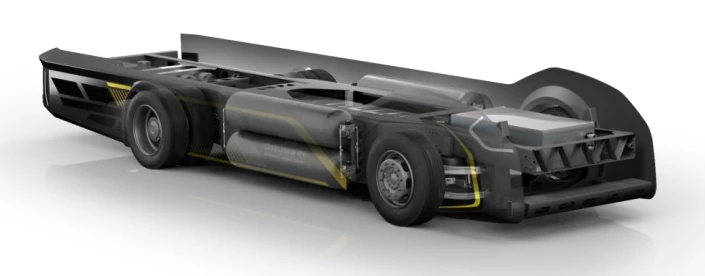Through trials and teasers from big names like Hyundai and Toyota, we are seeing how hydrogen could play a big role in moving towards sustainable trucking, and French outfit Gaussin has introduced a versatile skateboard platform it plans on riding into that future. Billed as the first of its type for heavy trucks, the platform can be adapted for mass production of not just hydrogen vehicles but electric ones too, and is also designed to accommodate autonomous driving capabilities.
Through its forward-thinking new skateboard chassis, Gaussin hopes to offer manufacturers of sustainable trucks an express route from the factory floor to the freeway. The modular platform is designed for class 8 tractor and straight trucks between 5.5 and 13.4 m (18 and 44 ft) in size, covering all applications from furniture moving services to heavy-haulers that lug loads between cities.
Gaussin is offering two versions of its skateboard platform. One is optimized for hydrogen with the necessary tanks and fuel cells and can be refueled in less than 20 minutes, with a listed range of 800 km (500 miles). The other is an all-electric version with the necessary motors, drivetrains and batteries, which will offer a 400 km (250 mile) range and can be swapped out for fresh ones in three minutes. In the real-world these range figures would vary greatly depending not just on the trucks the skateboard is powering, but what those vehicles are carrying. Both versions will allow for speeds of up to 90 km/h (55 mph).

The chassis is said to be 400 kg (881 lb) lighter than traditional truck chassis, and can be scaled up and down to meet different height, length and axle requirements. Total carry and tow capacity is specified at 40,000 kg and it features a universal plate for attachment of equipment plus an open interface for autonomous driving software.
“For the first time in the world of heavy trucks, Gaussin has created a versatile platform enabling the various players in the sector to achieve an extremely rapid time-to-market," says Jean-Claude Bailly, Managing Director Truck & Bus Division of Gaussin. "The solution will enable them to save precious time in project development, at a time when the heavy goods vehicle market is changing rapidly and innovation is a key differentiating factor, more than ever."
Gaussin has embarked on a production program that involves a global network of licensees to accelerate rollout of its skateboard platform, which it expects to begin next year. The slick animation below shows how the skateboard will come together.
Source: Gaussin






